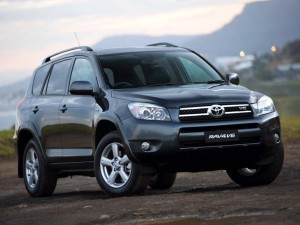Toyota has been stung by another recall, this one forcing it to notify owners of nearly 800,000 RAV4 SUVs and Lexus HS 250h hybrids that the rear suspensions on their vehicles could fail.
The recall is just the latest in a seemingly fast-increasing series of safety-related service actions that have impacted virtually every major automaker in recent weeks, a lit most recently including Ford, Honda and Mazda. Meanwhile, federal safety investigators are busy investigating a series of additional reports that could result in still more recalls.
Toyota’s latest recall covers 760,000 RAV4 crossover-utility vehicles sold between the 2006 through 2011 model-years, as well as another 18,000 Lexus HS 250h hybrids sold in model-year 2010.
In a statement, the maker noted the issue may actually be caused by routine maintenance. “Toyota has determined that if the nuts on the rear suspension arm are not tightened following the proper procedure and torque specification during a rear wheel alignment service, excessive play may occur at the threaded portion of the arm, followed by rust formation.”
The problem is that this corrosion could eventually lead to the rear suspension arm’s failure and separation, creating the risk a driver could lose control and crash.
The National Highway Traffic Safety Administration had already begun investigating a similar problem in the 2006 – 2008 models of the popular RAV4. That covered a total of 460,000 of the vehicles. The safety agency had received seven complaints involving the failure of a RAV4 rear suspension.
Toyota says that only vehicles that had undergone suspension alignment work would likely experience the problem – though adjusting a vehicle’s suspension is not an uncommon process in routine maintenance. The maker will advise owners to bring their vehicles in for inspection.
Toyota is developing a fix for the problem which it says will be made at no charge to consumers.
The surge in recalls in recent months has generated concern about industry quality – running counter to recent surveys suggesting today’s vehicles are more reliable than ever. A senior engineering source at Toyota acknowledged to TheDetroitBureau.com that the company has become much more sensitive to potential safety issues in the wake of its disastrous unintended acceleration scare in 2010 and 2011 – which resulted in CEO Akio Toyoda apologizing to a Congressional committee.
But all automakers appear to be less tempted to sidestep problems that, in the past, might have been dealt with on a case-by-case basis. And regulators have been less willing to give a manufacturer a pass following the 2011 Washington hearings that saw senior NHTSA officials also reprimanded.

